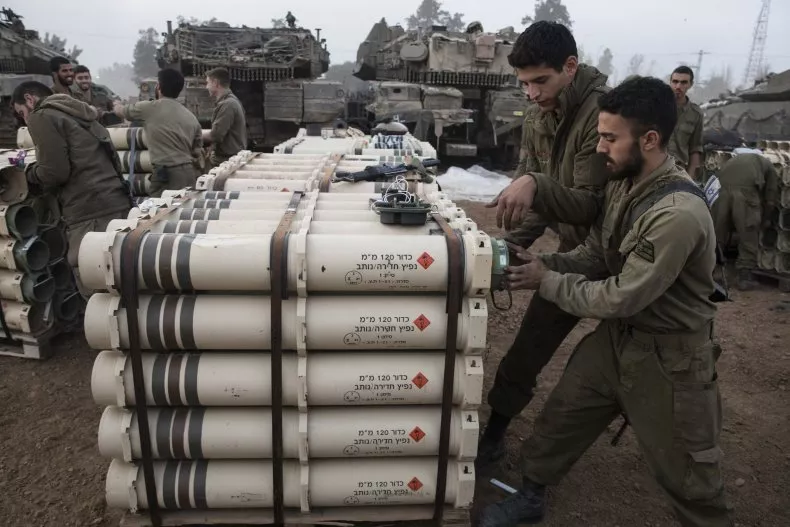It’s possible that the Israel military is relocating its people from the Gaza Strip in anticipation of a larger regional conflict in the upcoming weeks and months.
The Israel Defense Forces (IDF) declared on Monday that thousands of soldiers would be redeployed and that as early as this week, some reservists from at least two brigades would return to their homes and places of employment. Troops from three additional brigades will resume their regular training, which will be the biggest military withdrawal since Hamas assaulted Israel almost three months ago.
Following the deadliest Palestinian militant attack in Israel’s history, which was launched by Hamas on October 7, the nation launched its most intense airstrikes against Gaza. According to the Associated Press, Israeli officials claim that 1,200 people died in Hamas’ attack, but the Gaza Ministry of Health reports that over 21,900 Palestinians have lost their lives in the fighting.
The IDF said to Newsweek on Monday, “This move is expected to significantly alleviate economic burdens and enable them to gather strength for upcoming activities in the next year, as the fighting will persist and their services will still be needed.” in reference to the troop reduction.
“These adaptations aim to ensure effective planning and preparation for the continuation of operations in 2024,” the IDF statement continued. The IDF understands the need of planning ahead and prepares for both new missions and combat all year long.”
According to the AP, Israel claimed that over 8,000 Hamas fighters had been killed, although it has not offered any proof. The country holds Hamas accountable for the large number of civilian casualties and unrest in the area. Of Gaza’s 2.3 million Palestinians, around 85% have been forced to flee their homes.
In the event that the conflict escalates to involve Lebanon’s Hezbollah, which is supported by Iran, the troop withdrawal might also indicate a shift in Israel’s military strategy away from Hamas and Gaza and toward strengthening Israel’s northern border.
After the October 7 bombing, speculation about Hezbollah’s involvement in the Israeli-Palestinian conflict began almost immediately. Speaking, Israeli Prime Minister Benjamin Netanyahu discussed whether Israel could fend off any attacks using its Iron Dome defense system or other means, as well as the possible use of precision-guided munitions being amassed by Hezbollah, the Lebanese Shiite Muslim political party with an armed wing of the same name.
According to Reuters, Israel’s military stated that it launched an airstrike on Monday near the border with Lebanon, where artillery fire has grown accustomed.
An Israeli military spokesman, Daniel Hagari, informed media outlets on Sunday night that there might be “prolonged fighting” against Hamas and other possible enemies for the majority of 2024.
The IDF spokesperson’s description of “economic burdens” most likely alludes to recent bad domestic economic news.
According to The New York Times, the nonpartisan Taub Center for Social Policy Studies in Israel released a report in late December stating that the country’s economy was in danger of contracting by 2 percent this quarter due to reservists quitting their jobs to fight in the war and other unfavorable consequences.
Approximately 20 percent of the labor force, up roughly 17 percent since the Hamas attacks, vanished from the workforce in October as some 9,000 people were either drafted into the armed forces, stayed at home to care for their unschooled children, or were forced to flee their jobs due to physical damage to their workplaces.
Knesset member and former Israeli ambassador to the UN Danny Danon told Likud party members that part of the guilt for the recently announced military deployment should lie with the United States.
“Pressure from the United States is compromising Israel’s wartime gains,” Danon told Newsweek. “Giving in to this pressure won’t further the war’s objectives; it won’t guarantee the release of our hostages or Hamas’ defeat. What motivation does Hamas have to negotiate if it believes that Israel will stop operating regardless?
Danon continued, saying, “You led the nation with strength, clarity, and resolve at the beginning of the war, and the effects were evident. We have to keep this momentum going. Yahya Sinwar, a Palestinian official and chairman of Hamas, is currently receiving really positive news regarding our troops’ exit.”
During their meeting on December 28, Israeli Defense Minister Yoav Gallant and U.S. Defense Secretary Lloyd Austin talked about Hezbollah’s destabilizing actions in southern Lebanon as well as dangers to regional security.
A readout of a December 22 phone call between U.S. Secretary of State Antony Blinken and Gallant shows that Blinken discussed the continued efforts to release all the remaining hostages—in addition to providing increased levels of humanitarian assistance to Palestinian civilians in Gaza.
Blinken also “stressed the importance of measures to prevent the conflict from expanding, including affirmative steps to de-escalate tensions in the West Bank and to avoid escalation in Lebanon,” according to the readout.
Due to the growing number of civilian deaths in Gaza, the Biden administration has modified its stance to Israel, continuing to offer support while also raising awareness of the necessity of a ceasefire. The administration’s narrative has changed as a result of domestic pressure, particularly that of some Congressmen.

